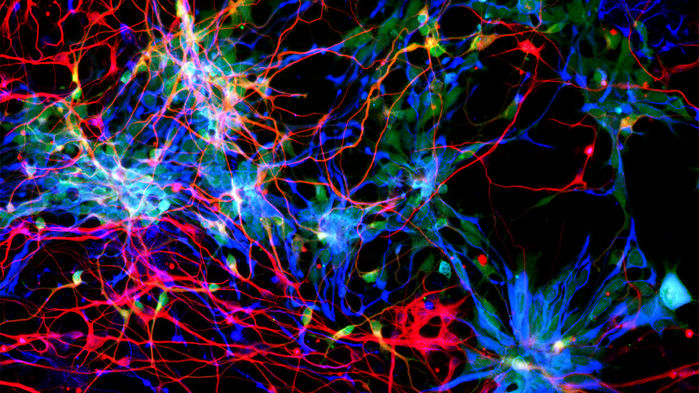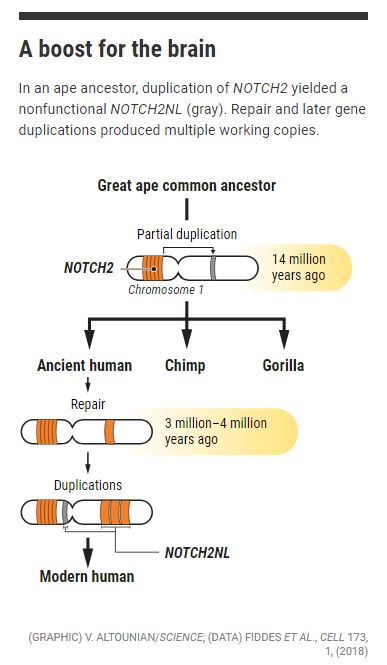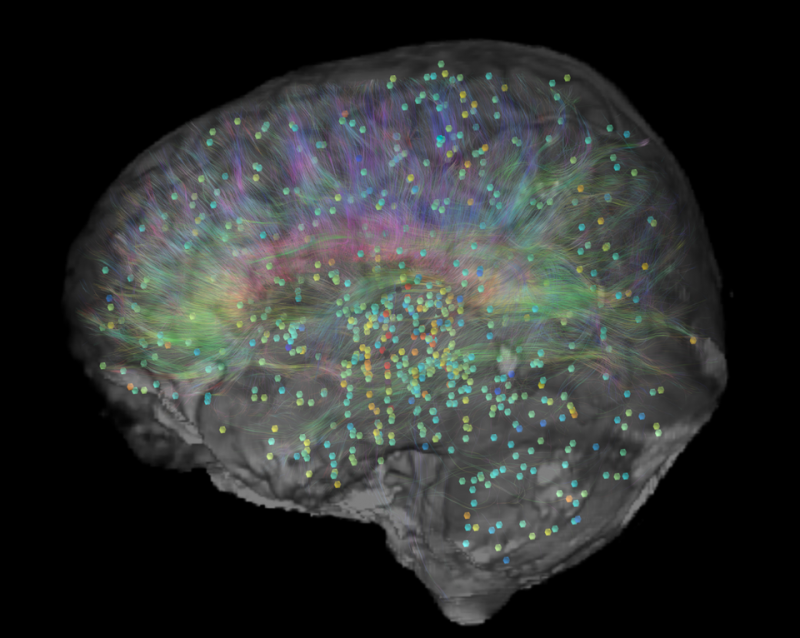It looks like you're using an Ad Blocker.
Please white-list or disable AboveTopSecret.com in your ad-blocking tool.
Thank you.
Some features of ATS will be disabled while you continue to use an ad-blocker.
5
share:
Interesting indeed and thought to share. Due to my precarious continuation I hit on any Neurological news I can find and this story caught my
interest.

A technique for growing these brain cortical neurons in a lab dish made it possible to track down more genes involved in brain expansion. I. SUZUKI ET AL., CELL 10.1016/J.CELL.2018.03.067 (2018)
Trio of genes supercharged human brain evolution

www.sciencemag.org...

www.dailygalaxy.com...
medicalxpress.com...

A technique for growing these brain cortical neurons in a lab dish made it possible to track down more genes involved in brain expansion. I. SUZUKI ET AL., CELL 10.1016/J.CELL.2018.03.067 (2018)
Trio of genes supercharged human brain evolution
Three nearly identical genes could help explain how 0.5 liters of gray matter in early human ancestors became the 1.4-liter organ that has made our species so successful and distinctive. The newly identified genes could also help explain how brain development sometimes goes wrong, leading to neurological disorders. The genes, descendants of an ancient developmental gene that multiplied and changed in the course of evolution, add to a growing list of DNA implicated in human brain expansion. But they stand out because so much has been learned about how they work their magic, says James Noonan, an evolutionary genomicist at Yale University. Researchers have shown that this trio boosts the number of potential nerve cells in brain tissue, and one team even pinned down the protein interactions likely responsible. “These are new proteins that are potentially modifying a very important pathway in brain development in a very powerful way,” Noonan adds. Until now, the four genes were thought to be one, NOTCH2NL, itself a spinoff of the NOTCH gene family, which controls the timing of development in everything from fruit flies to whales. But two studies in the 31 May issue of Cell trace a series of genetic accidents in recent evolutionary history that have yielded four very closely related NOTCH2NL genes in humans (see graphic, below).

David Haussler, a bioinformatician at the University of California, Santa Cruz, and his colleagues got on the trail of the genes after they discovered that the NOTCH pathway works differently in human and macaque brain organoids—test tube models of the developing brain. NOTCH2NL was missing in the macaque organoid and, later analyses showed, in other nonhuman apes as well. That suggested NOTCH2NL might have played a unique role in human evolution. By comparing NOTCH2NL-related DNA in the genomes of humans and other primates, Haussler’s team reconstructed the genes’ evolutionary history. They concluded that during DNA replication perhaps 14 million years ago, part of an ancestral NOTCH2 gene was copied by mistake. The new “gene” was incomplete and nonfunctional, but about 11 million years later—shortly before human ancestors’ brains began to expand—an additional piece of NOTCH2 got inserted into this copy, making the gene functional. “This event marks the birth of the NOTCH2NL genes we now have in our brains,” says Frank Jacobs, a co–senior author on the paper and an evolutionary genomicist at the University of Amsterdam. Subsequently, that active NOTCH2NL gene was duplicated twice more, yielding three active NOTCH2NL genes in a row at one end of human chromosome 1 and one inactive copy on the other end. Gene copies can be potent evolutionary forces because one copy continues its necessary job, leaving the others free to do something new.
www.sciencemag.org...

Over the last million years of evolution, our brain underwent a considerable increase in size and complexity, resulting in the exceptional cognitive abilities of the human species. This brain enlargement is largely due to an increase in the number of neurons in the cerebral cortex, the outer part of the brain. Since we share about 99% of our genome with that of our closest living relative, the chimpanzee, it has remained a daunting task for scientists to identify which human-specific gene changes may underlie the unique aspects of human brain evolution.
www.dailygalaxy.com...
medicalxpress.com...
edit on 31 5 2018 by skywatcher44 because: Add a Little..
Humans are scavangers. We basically rot our foods by cooking and aging them which creates extra neurochemistry in the food. Tyramines form
neurochemicals and we have evolved to utilize them which gives us extera brain power to create things we do not need. Scavangers tend to be smarter
in the animal world, at least in a way humans define intelligence.
Of course our cats know the whole story, they feel sorry for us because we are so gullible but respect us for being such good servants to them.
Of course our cats know the whole story, they feel sorry for us because we are so gullible but respect us for being such good servants to them.
with the name mouse I would think cats would not be your strong suit
new topics
-
Las Vegas UFO Spotting Teen Traumatized by Demon Creature in Backyard
Aliens and UFOs: 20 minutes ago -
2024 Pigeon Forge Rod Run - On the Strip (Video made for you)
Automotive Discussion: 1 hours ago -
Gaza Terrorists Attack US Humanitarian Pier During Construction
Middle East Issues: 1 hours ago -
The functionality of boldening and italics is clunky and no post char limit warning?
ATS Freshman's Forum: 2 hours ago -
Meadows, Giuliani Among 11 Indicted in Arizona in Latest 2020 Election Subversion Case
Mainstream News: 3 hours ago -
Massachusetts Drag Queen Leads Young Kids in Free Palestine Chant
Social Issues and Civil Unrest: 3 hours ago -
Weinstein's conviction overturned
Mainstream News: 4 hours ago -
Supreme Court Oral Arguments 4.25.2024 - Are PRESIDENTS IMMUNE From Later Being Prosecuted.
Above Politics: 6 hours ago -
Krystalnacht on today's most elite Universities?
Social Issues and Civil Unrest: 6 hours ago -
Chris Christie Wishes Death Upon Trump and Ramaswamy
Politicians & People: 6 hours ago
5
